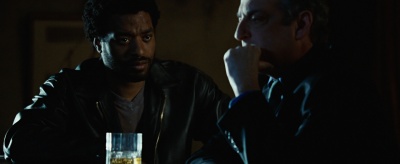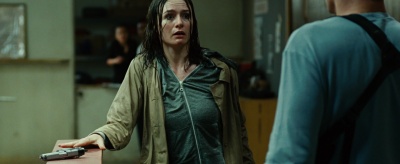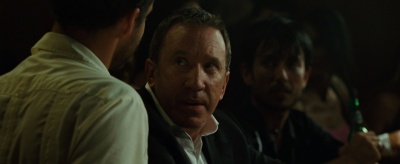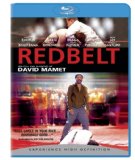| Reviews & Columns |
|
Reviews DVD TV on DVD Blu-ray 4K UHD International DVDs In Theaters Reviews by Studio Video Games Features Collector Series DVDs Easter Egg Database Interviews DVD Talk Radio Feature Articles Columns Anime Talk DVD Savant Horror DVDs The M.O.D. Squad Art House HD Talk Silent DVD
|
DVD Talk Forum |
|
|
| Resources |
|
DVD Price Search Customer Service #'s RCE Info Links |
|
Columns
|
|
|
Redbelt
Sony Pictures // R // August 26, 2008 // Region 0
List Price: $38.96 [Buy now and save at Amazon]
David Mamet mentions throughout the extras on this Blu-ray disc that Redbelt is a fighting movie. This is true, but it's still a Mamet film: it's not going to march in lockstep with some off-the-rack underdog sports formula or mindlessly string together one brawl after another for an hour and a half straight. No, Mike Terry (Chiwetel Ejiofor) isn't pitted against a coke dealer who butchered his wife and isn't plowing his way through the ranks of some obnoxious championship; he's fighting to maintain his own sense of honor and integrity in a city hellbent on exploiting it.
Terry carried away from a stint in Rio both a jaw-droppingly beautiful wife (Alice Braga) and a mastery of Brazilian jiu-jitsu. He not interested in exploiting his talents in the fighting circuit, though, shrugging off competition as a toxic influence on the purity of the art. He's content to run a small, unassuming jiu-jitsu academy in Los Angeles, although it's a constant drain on the couple's finances and is starting to take its toll on their marriage as a whole. A mishap with a skittish, strung-out lawyer (Emily Mortimer) who shoots out the dojo's storefront window looks to be a final, fatal blow, but it's just
one of several dangling threads that eventually intertwine: a cop eager to earn Terry's approval despite being screwed out of who knows how many thousands of dollars by his instructor's brother-in-law, a sketchy mixed martial arts pay-per-view tournament trying to sleaze Terry in as an undercard, and an over-the-hill, self-destructive movie star (Tim Allen) who turns to Terry to help prop up an action flick he's shooting after being rescued from a drunken bar fight. As a sort of modern-day samurai, Terry clings to his honor as best he can, but it's under constant attack, and seemingly every bright turn in his life is followed by some sort of crushing betrayal.
Redbelt's greatest strength is the magnetic allure of Chiwetel Ejiofor, one of very few actors able to deftly juggle the gruelingly physical aspects of this sort of role, the introspection and quiet intensity it demands, and dialogue that'd almost certainly sound awkward or insincere delivered by most anyone else ("Who imposes the terms of the battle will impose the terms of the peace"; "A man distracted is a man defeated"). While most action movies follow heroes who are trying to achieve or attain something, Mike Terry is simply trying to hold onto what he already has, and while that may not be as conventionally dramatic, it is compelling. Ejiofor heads a strong group of actors, drawing quite a bit from Mamet's familiar repertory cast. One new addition is Tim Allen in an memorable and entirely straight supporting role. Echoing The Spanish Prisoner which saw Steve Martin playing against type as a con man, Redbelt sees the usually family-friendly comedian taking on a character who's darker and more introspective, and Allen makes the transition to drama seamlessly.
Meticulously crafted dialogue is typically a defining characteristic of a Mamet film, and although some of the writing does still sparkle, here he seems much more intensely focused on story and characterization than the rhythm and cadence of what's being spoken. Having himself practiced Brazilian jiu-jitsu for several years before helming Redbelt, Mamet's passion and close familiarity with the art shines through, and it's intriguing to see how he balances the handful of physical struggles with the more pervasive and nearly as intense emotional ones. Although the narrative does get somewhat shaky in its final act -- it hinges on a sprawling conspiracy that's not just unnecessarily elaborate; there doesn't seem to be any need for it at all -- the bulk of Redbelt is wholly engaging, building to a stunningly beautiful, violent crescendo. There's a climax that seems as if it's being telegraphed far in advance, but Mamet resists being seduced by convention, serving up a satisfyingly brutal finale without falling into formula.
With Redbelt, David Mamet takes the skeleton of a '40s boxing flick and infuses it with a sensibility that's not merely more modern but distinctively his own. Highly Recommended.
Video: Redbelt looks wonderful on Blu-ray, presented in 1080p at its theatrical aspect ratio of 2.39:1 and encoded with AVC. As expected for a day-and-date release from Sony, the presentation is immaculate. The scope image boasts a strong sense of depth and dimensionality, and the level of fine detail is frequently striking. Its palette is generally somewhat subdued but is beautifully saturated when called for, especially Chet Frank's palatial Hollywood estate and Sondra's stunning green dress. Contrast runs somewhat hot as a seemingly intentional part of the film's aesthetic, black levels are consistently robust, and the thin veil of film grain remains tight and unintrusive.
Audio: Redbelt may be a story about a fighter, but the film itself is driven most intensely by its dialogue. It follows that the 16-bit Dolby TrueHD soundtrack on this Blu-ray disc isn't remarkably dynamic or aggressive, although it does suit the movie particularly well. Each element of the mix is clear and distinct, Mamet's distinctive dialogue is rendered flawlessly, and even Redbelt's more
subdued stretches are frequently brimming with ambiance in the surround channels. The soundtrack screams to life during the fight sequences, of course, with the kicks, punches, and throws bolstered by a punishingly meaty thud. The flurries of drums -- particularly over the opening titles -- also sound outstanding on this lossless soundtrack. Mamet mentions elsewhere on this disc that the third act of Redbelt, which is set almost entirely inside an arena, only had five extras or so in the stands, but the roar of the crowd is so convincingly enormous that I would've assumed they'd filled every last seat during filming. Redbelt's sound design may not be especially flashy, but it does effectively complement the film, and that's all I'm ever really hoping to hear.
TrueHD soundtracks are also offered in French and Portuguese alongside Dolby Digital 5.1 dubs in Spanish and Thai. Like most Sony day-and-date releases, the selection of subtitles is sprawling -- English (both traditional and SDH), French, Spanish, Portuguese, Thai, Arabic, Chinese, Dutch, Indonesian, and Korean -- and the commentary track features its own pared-down set of subtitles.
Extras: The first of Redbelt's extras is an audio commentary with David Mamet and Randy Couture. Even though Couture only has a minor supporting role in the movie itself, he does an excellent job prodding the discussion along, frequently asking Mamet questions and relating what's shown in the film to his own background in mixed martial arts. Mamet particularly enjoys having Couture describe each and every move Mike Terry unleashes. This is a predominately conversational audio commentary, not mired in intensely technical notes about the nuts and bolts of production. Among the highlights are Mamet noting that he disagrees with his character's assertion that competition weakens purity, the psychological limitations of performing in front of a crowd or a 35mm film camera, and how similarly the movie producers and fight promoters reflect some of Mamet's own experiences in Hollywood. It's an engaging commentary and well worth setting aside an hour and a half to give a listen.
The only of the disc's extras not to be presented in high definition is a 26 minute Q&A with David Mamet, pieced together from a session following a screening of the film this past April. As its length would suggest, this is a comprehensive discussion, touching on -- among many other topics -- the cinematic touchstones Mamet turned to for Redbelt, embracing the full width of the Cinemascope frame, how he approaches writing for film versus the stage and television, whether or not he enjoys watching his own work, and even a lengthy sidebar about Fibonacci numbers. Mamet's charisma and quick wit shine through once
again, and this Q&A too is essential viewing for anyone buying or renting this disc.
The five remaining featurettes on Redbelt are all presented in 1080i. The first of them is "Behind the Scenes of Redbelt" (20 min.), which explores the familiar Mametian theme of how commerce impacts art, shaping the look of the film from costume and production design to shooting in less familiar stretches of Hollywood, and Mamet's approach to directing seasoned actors as well as first-timers. Casting notes are a dominant topic, including Tim Allen playing against type and Mamet's comparison of Chiwetel Ejiofor to Henry Fonda. The rigorous training and fight choreography are also briefly touched upon.
"Inside Mixed Martial Arts" (19 min.) opens with a focus on jiu-jitsu: the art itself, its origins in Japan, the adapted style that would emerge centuries later in Brazil, and its role in the birth of mixed martial arts. The featurette also takes a look at the collaborative choreography of the fight sequences and how the approach is realistic but skewed to better play to the camera. A number of fighters are also interviewed, including Mamet, who himself has embraced mixed martial arts for several years now.
Dana White, the high sheriff of the UFC, is featured in "Inside Mixed Martial Arts", and his full 17 minute interview is offered as its own extra. White is proselytizing for the UFC, by and large, noting his role in reshaping the brand to be more accessible, plugging the reality show 'Trojan horse' that helped it break through, and noting the sport's enormous international success. The discussion naturally revolves around the UFC, but there are some comments about mixed martial arts in general as well, such as the necessity for fighters to be well-versed in many different styles to succeed and how Bruce Lee was one of the first proponents for what would eventually become MMA.
Also included is a series of "Fighter Profiles" (4 min.), running through the fighting styles, nicknames, backgrounds, and accomplishments of the athletes featured throughout the film. The last of the featurettes is "The Magic of Cyril Takayama" (4 min.), which briefly notes the magician's background, how he was cast in the film, and how he didn't resort to any camera trickery, but it's mostly an excuse to show off an unreal trick with a cigarette that he used to land the gig.
Redbelt is a BD Live enabled disc, although as of this writing, the feature has yet to be enabled. High definition trailers for Redbelt and a slew of other Sony films round out the extras.
Conclusion: Redbelt takes a classic samurai film in the Kurosawa tradition and filters it through both the world of mixed martial arts and the distinctive voice of David Mamet. The result is cerebral, visceral, and exceptionally well acted. Although Mamet does stumble a bit as he tries to bridge the second act and the swift, elegant violence of the film's final moments, I greatly enjoyed Redbelt, and it's a worthwhile discovery on Blu-ray. The film looks and sounds wonderful on the format, and this disc features a fairly extensive assortment of high definition extras as well. Highly Recommended.
Terry carried away from a stint in Rio both a jaw-droppingly beautiful wife (Alice Braga) and a mastery of Brazilian jiu-jitsu. He not interested in exploiting his talents in the fighting circuit, though, shrugging off competition as a toxic influence on the purity of the art. He's content to run a small, unassuming jiu-jitsu academy in Los Angeles, although it's a constant drain on the couple's finances and is starting to take its toll on their marriage as a whole. A mishap with a skittish, strung-out lawyer (Emily Mortimer) who shoots out the dojo's storefront window looks to be a final, fatal blow, but it's just
 |
| [click on the thumbnail to enlarge] |
Redbelt's greatest strength is the magnetic allure of Chiwetel Ejiofor, one of very few actors able to deftly juggle the gruelingly physical aspects of this sort of role, the introspection and quiet intensity it demands, and dialogue that'd almost certainly sound awkward or insincere delivered by most anyone else ("Who imposes the terms of the battle will impose the terms of the peace"; "A man distracted is a man defeated"). While most action movies follow heroes who are trying to achieve or attain something, Mike Terry is simply trying to hold onto what he already has, and while that may not be as conventionally dramatic, it is compelling. Ejiofor heads a strong group of actors, drawing quite a bit from Mamet's familiar repertory cast. One new addition is Tim Allen in an memorable and entirely straight supporting role. Echoing The Spanish Prisoner which saw Steve Martin playing against type as a con man, Redbelt sees the usually family-friendly comedian taking on a character who's darker and more introspective, and Allen makes the transition to drama seamlessly.
Meticulously crafted dialogue is typically a defining characteristic of a Mamet film, and although some of the writing does still sparkle, here he seems much more intensely focused on story and characterization than the rhythm and cadence of what's being spoken. Having himself practiced Brazilian jiu-jitsu for several years before helming Redbelt, Mamet's passion and close familiarity with the art shines through, and it's intriguing to see how he balances the handful of physical struggles with the more pervasive and nearly as intense emotional ones. Although the narrative does get somewhat shaky in its final act -- it hinges on a sprawling conspiracy that's not just unnecessarily elaborate; there doesn't seem to be any need for it at all -- the bulk of Redbelt is wholly engaging, building to a stunningly beautiful, violent crescendo. There's a climax that seems as if it's being telegraphed far in advance, but Mamet resists being seduced by convention, serving up a satisfyingly brutal finale without falling into formula.
With Redbelt, David Mamet takes the skeleton of a '40s boxing flick and infuses it with a sensibility that's not merely more modern but distinctively his own. Highly Recommended.
Video: Redbelt looks wonderful on Blu-ray, presented in 1080p at its theatrical aspect ratio of 2.39:1 and encoded with AVC. As expected for a day-and-date release from Sony, the presentation is immaculate. The scope image boasts a strong sense of depth and dimensionality, and the level of fine detail is frequently striking. Its palette is generally somewhat subdued but is beautifully saturated when called for, especially Chet Frank's palatial Hollywood estate and Sondra's stunning green dress. Contrast runs somewhat hot as a seemingly intentional part of the film's aesthetic, black levels are consistently robust, and the thin veil of film grain remains tight and unintrusive.
Audio: Redbelt may be a story about a fighter, but the film itself is driven most intensely by its dialogue. It follows that the 16-bit Dolby TrueHD soundtrack on this Blu-ray disc isn't remarkably dynamic or aggressive, although it does suit the movie particularly well. Each element of the mix is clear and distinct, Mamet's distinctive dialogue is rendered flawlessly, and even Redbelt's more
 |
| [click on the thumbnail to enlarge] |
TrueHD soundtracks are also offered in French and Portuguese alongside Dolby Digital 5.1 dubs in Spanish and Thai. Like most Sony day-and-date releases, the selection of subtitles is sprawling -- English (both traditional and SDH), French, Spanish, Portuguese, Thai, Arabic, Chinese, Dutch, Indonesian, and Korean -- and the commentary track features its own pared-down set of subtitles.
Extras: The first of Redbelt's extras is an audio commentary with David Mamet and Randy Couture. Even though Couture only has a minor supporting role in the movie itself, he does an excellent job prodding the discussion along, frequently asking Mamet questions and relating what's shown in the film to his own background in mixed martial arts. Mamet particularly enjoys having Couture describe each and every move Mike Terry unleashes. This is a predominately conversational audio commentary, not mired in intensely technical notes about the nuts and bolts of production. Among the highlights are Mamet noting that he disagrees with his character's assertion that competition weakens purity, the psychological limitations of performing in front of a crowd or a 35mm film camera, and how similarly the movie producers and fight promoters reflect some of Mamet's own experiences in Hollywood. It's an engaging commentary and well worth setting aside an hour and a half to give a listen.
The only of the disc's extras not to be presented in high definition is a 26 minute Q&A with David Mamet, pieced together from a session following a screening of the film this past April. As its length would suggest, this is a comprehensive discussion, touching on -- among many other topics -- the cinematic touchstones Mamet turned to for Redbelt, embracing the full width of the Cinemascope frame, how he approaches writing for film versus the stage and television, whether or not he enjoys watching his own work, and even a lengthy sidebar about Fibonacci numbers. Mamet's charisma and quick wit shine through once
 |
| [click on the thumbnail to enlarge] |
The five remaining featurettes on Redbelt are all presented in 1080i. The first of them is "Behind the Scenes of Redbelt" (20 min.), which explores the familiar Mametian theme of how commerce impacts art, shaping the look of the film from costume and production design to shooting in less familiar stretches of Hollywood, and Mamet's approach to directing seasoned actors as well as first-timers. Casting notes are a dominant topic, including Tim Allen playing against type and Mamet's comparison of Chiwetel Ejiofor to Henry Fonda. The rigorous training and fight choreography are also briefly touched upon.
"Inside Mixed Martial Arts" (19 min.) opens with a focus on jiu-jitsu: the art itself, its origins in Japan, the adapted style that would emerge centuries later in Brazil, and its role in the birth of mixed martial arts. The featurette also takes a look at the collaborative choreography of the fight sequences and how the approach is realistic but skewed to better play to the camera. A number of fighters are also interviewed, including Mamet, who himself has embraced mixed martial arts for several years now.
Dana White, the high sheriff of the UFC, is featured in "Inside Mixed Martial Arts", and his full 17 minute interview is offered as its own extra. White is proselytizing for the UFC, by and large, noting his role in reshaping the brand to be more accessible, plugging the reality show 'Trojan horse' that helped it break through, and noting the sport's enormous international success. The discussion naturally revolves around the UFC, but there are some comments about mixed martial arts in general as well, such as the necessity for fighters to be well-versed in many different styles to succeed and how Bruce Lee was one of the first proponents for what would eventually become MMA.
Also included is a series of "Fighter Profiles" (4 min.), running through the fighting styles, nicknames, backgrounds, and accomplishments of the athletes featured throughout the film. The last of the featurettes is "The Magic of Cyril Takayama" (4 min.), which briefly notes the magician's background, how he was cast in the film, and how he didn't resort to any camera trickery, but it's mostly an excuse to show off an unreal trick with a cigarette that he used to land the gig.
Redbelt is a BD Live enabled disc, although as of this writing, the feature has yet to be enabled. High definition trailers for Redbelt and a slew of other Sony films round out the extras.
Conclusion: Redbelt takes a classic samurai film in the Kurosawa tradition and filters it through both the world of mixed martial arts and the distinctive voice of David Mamet. The result is cerebral, visceral, and exceptionally well acted. Although Mamet does stumble a bit as he tries to bridge the second act and the swift, elegant violence of the film's final moments, I greatly enjoyed Redbelt, and it's a worthwhile discovery on Blu-ray. The film looks and sounds wonderful on the format, and this disc features a fairly extensive assortment of high definition extras as well. Highly Recommended.
|
| Popular Reviews |
| Sponsored Links |
|
|
| Sponsored Links |
|
|
| Release List | Reviews | Shop | Newsletter | Forum | DVD Giveaways | Blu-Ray | Advertise |
|
Copyright 2024 DVDTalk.com All Rights Reserved. Legal Info, Privacy Policy, Terms of Use,
Manage Preferences,
Your Privacy Choices | |||||||












